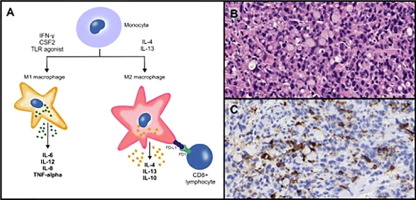当前位置:
X-MOL 学术
›
Cancer Treat. Rev.
›
论文详情
Our official English website, www.x-mol.net, welcomes your
feedback! (Note: you will need to create a separate account there.)
The role of tumor-associated macrophages in gastric cancer development and their potential as a therapeutic target.
Cancer Treatment Reviews ( IF 9.6 ) Pub Date : 2020-03-23 , DOI: 10.1016/j.ctrv.2020.102015 V Gambardella 1 , J Castillo 2 , N Tarazona 1 , F Gimeno-Valiente 3 , C Martínez-Ciarpaglini 4 , M Cabeza-Segura 3 , S Roselló 1 , D Roda 1 , M Huerta 3 , A Cervantes 1 , T Fleitas 1
Cancer Treatment Reviews ( IF 9.6 ) Pub Date : 2020-03-23 , DOI: 10.1016/j.ctrv.2020.102015 V Gambardella 1 , J Castillo 2 , N Tarazona 1 , F Gimeno-Valiente 3 , C Martínez-Ciarpaglini 4 , M Cabeza-Segura 3 , S Roselló 1 , D Roda 1 , M Huerta 3 , A Cervantes 1 , T Fleitas 1
Affiliation

|
Gastric cancer (GC) represents the fifth cause of cancer-related death worldwide. Molecular biology has become a central area of research in GC and there are currently at least three major classifications available to elucidate the mechanisms that drive GC oncogenesis. Further, tumor microenvironment seems to play a crucial role, and tumor-associated macrophages (TAMs) are emerging as key players in GC development. TAMs are cells derived from circulating chemokine- receptor-type 2 (CCR2) inflammatory monocytes in blood and can be divided into two main types, M1 and M2 TAMs. M2 TAMs play an important role in tumor progression, promoting a pro-angiogenic and immunosuppressive signal in the tumor. The diffuse GC subtype, in particular, seems to be strongly characterized by an immuno-suppressive and pro-angiogenic phenotype. No molecular targets in this subgroup have yet been identified. There is an urgent need to understand the molecular pathways and tumor microenvironment features in the GC molecular subtypes. The role of anti-angiogenics and checkpoint inhibitors has recently been clinically validated in GC. Both ramucirumab, a fully humanized IgG1 monoclonal anti-vascular endothelial growth factor receptor 2 (VEGFR2) antibody, and checkpoint inhibitors in Epstein Bar Virus (EBV) and Microsatellite Instable (MSI) subtypes, have proved beneficial in advanced GC. Nevertheless, there is a need to identify predictive markers of response to anti-angiogenics and immunotherapy in clinical practice for a personalized treatment approach. The importance of M2 TAMs in development of solid tumors is currently gaining increasing interest. In this literature review we analyze immune microenvironment composition and signaling related to M1 and M2 TAMs in GC as well as its potential role as a therapeutic target.
中文翻译:

肿瘤相关巨噬细胞在胃癌发展中的作用及其作为治疗靶标的潜力。
胃癌(GC)代表了全世界与癌症相关的死亡的第五大原因。分子生物学已成为GC研究的中心领域,目前至少有三种主要分类可用于阐明驱动GC肿瘤发生的机制。此外,肿瘤的微环境似乎起着至关重要的作用,并且肿瘤相关的巨噬细胞(TAM)正在成为GC开发中的关键角色。TAM是源自血液中循环趋化因子受体2型(CCR2)炎性单核细胞的细胞,可分为两种主要类型,M1和M2 TAM。M2 TAM在肿瘤进展中起重要作用,在肿瘤中促进促血管生成和免疫抑制信号。尤其是弥漫性GC亚型似乎具有免疫抑制和促血管生成表型的强烈特征。该亚组中尚无分子靶标。迫切需要了解GC分子亚型的分子途径和肿瘤微环境特征。抗血管生成药和检查点抑制剂的作用最近在GC中得到了临床验证。事实证明,完全人源化的IgG1单克隆抗血管内皮生长因子受体2(VEGFR2)抗体ramucirumab和Epstein Bar Virus(EBV)和Microsatellite Instable(MSI)亚型的检查点抑制剂都对晚期GC有益。尽管如此,仍需要在临床实践中针对个性化治疗方法鉴定对抗血管生成和免疫疗法反应的预测性标志物。目前,M2 TAM在实体瘤发展中的重要性越来越高。
更新日期:2020-03-26
中文翻译:

肿瘤相关巨噬细胞在胃癌发展中的作用及其作为治疗靶标的潜力。
胃癌(GC)代表了全世界与癌症相关的死亡的第五大原因。分子生物学已成为GC研究的中心领域,目前至少有三种主要分类可用于阐明驱动GC肿瘤发生的机制。此外,肿瘤的微环境似乎起着至关重要的作用,并且肿瘤相关的巨噬细胞(TAM)正在成为GC开发中的关键角色。TAM是源自血液中循环趋化因子受体2型(CCR2)炎性单核细胞的细胞,可分为两种主要类型,M1和M2 TAM。M2 TAM在肿瘤进展中起重要作用,在肿瘤中促进促血管生成和免疫抑制信号。尤其是弥漫性GC亚型似乎具有免疫抑制和促血管生成表型的强烈特征。该亚组中尚无分子靶标。迫切需要了解GC分子亚型的分子途径和肿瘤微环境特征。抗血管生成药和检查点抑制剂的作用最近在GC中得到了临床验证。事实证明,完全人源化的IgG1单克隆抗血管内皮生长因子受体2(VEGFR2)抗体ramucirumab和Epstein Bar Virus(EBV)和Microsatellite Instable(MSI)亚型的检查点抑制剂都对晚期GC有益。尽管如此,仍需要在临床实践中针对个性化治疗方法鉴定对抗血管生成和免疫疗法反应的预测性标志物。目前,M2 TAM在实体瘤发展中的重要性越来越高。











































 京公网安备 11010802027423号
京公网安备 11010802027423号